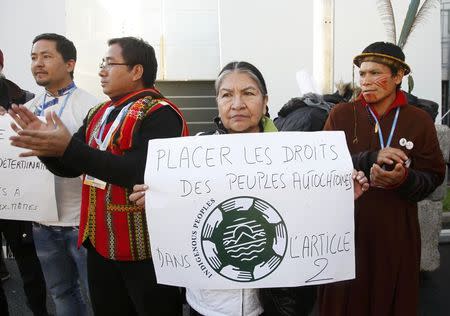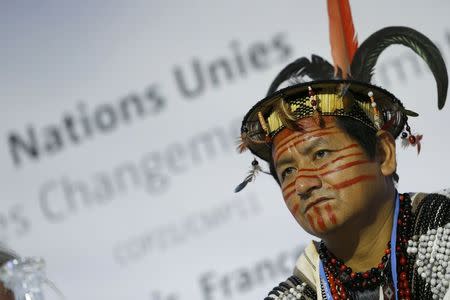Paris climate deal must ensure respect for human rights: U.N.
By Megan Rowling PARIS (Thomson Reuters Foundation) - From Pacific islanders losing their homelands to encroaching seas, to indigenous people forced from their forests in the name of conservation, human rights are already being violated by both climate change impacts and solutions, U.N. rights experts said. At climate talks in Paris, tasked with hammering out a new deal to tackle global warming by the end of this week, the experts called for strong language on respecting human rights and the rights of indigenous people to be included in the agreement. "The climate crisis is a human rights crisis," said Craig Mokhiber of the Office of the High Commissioner for Human Rights. "It needs to be addressed as such, and it needs to start right here in Paris." In a report released on Thursday, which is International Human Rights Day, the U.N. Environment Programme said the far-reaching environmental impacts of climate change pose a threat to human rights, including the rights to health, food, water and adequate housing. The effects are already being felt by millions of people around the world, said Zeid Ra'ad Al Hussein, the U.N High Commissioner for Human Rights, in a statement. An outcome in Paris that would protect human rights should include a binding obligation to respect human rights in climate action, a commitment to keep global temperature rise to below 1.5 degrees Celsius, and delivery of $100 billion a year in funding to help developing states deal with the effects of climate change, the experts told journalists in Paris. There has been concern that some states - including Saudi Arabia, Norway and the United States - have been trying to weaken the presence of human rights in the climate deal. They worry a binding provision could lead to more litigation and constrain some options for reducing climate-changing emissions, such as forest protection schemes and big hydro-electric dams, observers say. "There is a relationship between human rights and climate change - Paris can't do anything about pretending that relationship doesn't exist," said John Knox, the United Nations Special Rapporteur on Human Rights and the Environment. "What it can do is recognize that the relationship does exist and do something about it." All 195 states at the negotiations belong to at least one human rights treaty, he noted, and those treaties require them to take steps to protect rights from harm due to environmental degradation and climate change. "That means they must ensure their climate change actions meet human rights obligations," he added. The latest draft text includes a proposal in the binding section that a Paris agreement should be implemented "on the basis of respect for human rights". But its survival is not yet assured, and workers', women's and indigenous groups are unhappy that specific references to their rights now feature only in a non-binding introduction. Former Irish president and U.N. special envoy on climate change, Mary Robinson, said she expected there would be "significant pressure" to re-instate binding language on promoting gender equality. A new version of the agreement is due out on Thursday afternoon. INDIGENOUS CARBON Victoria Tauli-Corpuz, the U.N. Special Rapporteur on the Rights of Indigenous Peoples, said indigenous communities have helped keep climate change in check by saving forests and managing ecosystems well. "We live very simple lives - we don't over-consume and over-produce," said Tauli-Corpuz, who is of Philippines Igorot ethnicity. "When human rights are protected and respected, then climate change mitigation is achieved," she added. New analysis, released last week, shows that indigenous territories in the Amazon Basin, the Mesoamerican region, Democratic Republic of Congo and Indonesia contain 20 percent of the carbon stored above ground in the planet’s tropical forests. The number demonstrates the historical role indigenous people have played in conserving forests, and their importance in keeping them standing, said the report from Woods Hole Research Center, the Environmental Defense Fund and several indigenous networks. Any programs to conserve forests must enable indigenous people to participate in their planning and implementation, and must gain their consent, Tauli-Corpuz said. Local communities also need to be protected from the loss of their land as part of efforts to make biofuel from crops, build dams to generate hydro-electricity, or mine uranium for nuclear power production, she added. Several countries, including the Philippines, Costa Rica, Canada, Mexico and Chile, have been pushing to ensure human rights are inscribed in the Paris climate deal. Tauli-Corpuz urged other countries that have also signed an international pledge on human rights and climate action - including France - to join them. "You cannot bargain away human rights," she said. (Reporting by Megan Rowling; editing by Laurie Goering. Please credit the Thomson Reuters Foundation, the charitable arm of Thomson Reuters, that covers humanitarian news, women's rights, trafficking, corruption and climate change. Visit www.trust.org)




